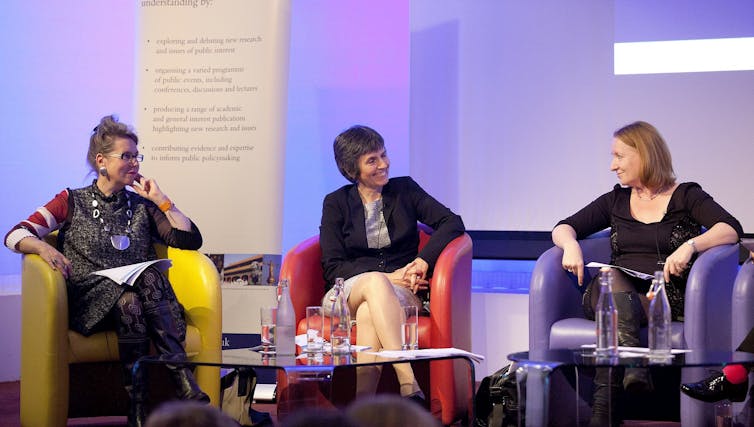Why do men ask more questions than women in scientific seminars?
The world of work is a man's world: women are paid almost 20% less than their male counterparts. With equal experience, men are promoted more easily, mothers are less likely to be hired, while fathers are paid more.
Alecia Carter, University of Montpellier

Successful women are less appreciated—but the opposite is true for men. The status of women has improved over the past 30 years, but this progress is slowing down: gender inequality in the workplace is here to stay.
For more information:
Gender pay gap: conversation with Isabelle Bensidoun
Sexism and the academic world
The world of research is no exception. While 59% of bachelor's degree holders are women, only 21% of professors are women, hence the Anglo-Saxon image of the "leaky pipeline. "
Several explanations have been proposed: men and women may differ in terms of intelligence, career choices, and investment in their children's education; their CVs may be evaluated differently; differences in salary may lead to differences in behavior; women may suffer more from imposter syndrome (lack of self-confidence) or lack female role models. Whatever the cause, the result is clear: prominent figures in science are rarely women.
For more information:
Student evaluations of teaching and gender stereotypes
Why should we care? Having role models greatly influences career choices (people are motivated when they can identify with a successful role model).
The lack of visibility of women, which probably contributes to the "leaky pipeline," is unfortunately not limited to the most prominent positions: men are more often the first or last author of publications ( the most prestigious positions), men's articles are cited more often, men are more often invited to conferences, and men ask more questions at scientific conferences.
But none of this really applies to the beginning of an academic career.
Men ask more questions than women.
So what happens when vocations are formed? For most students, research seminars represent their first contact with a group of researchers, their first opportunity to attend or participate in scientific debates.
The modest weekly seminar is not just a place for a speaker to present their work to their community: it is an essential training opportunity, immersing future researchers in a culture and potentially shaping lasting impressions by highlighting leading figures in the field and recipes for success. It is therefore important to know who asks questions after the presentation.
We collected data on this subject in 10 countries, representing nearly 250 seminars. Most of the time, the audience at these seminars was balanced between men and women, at least in the sample of seminars that we (and the colleagues who helped us) attended in biology, psychology, and philosophy. But a question was on average 2.5 times more likely to be asked by a man than by a woman. Men were therefore much more visible than women in the audience.

Mikael Kristenson/Unsplash, CC BY
One might think that this imbalance was due to the hierarchical bias described above (men occupying more positions of responsibility than women, and those in higher positions asking more questions). But an online questionnaire shows that the imbalance is widespread: among experienced researchers, men ask more questions than women, and the same is true at the beginning of their careers.
Furthermore, the proportion of female professors does not explain the gender imbalance in the questions asked at a given seminar. Men simply ask more questions than women.
How can this disparity be explained?
Where does this imbalance come from? There are two possible reasons: either women ask to speak less often, or they are given the floor less readily than men. Both mechanisms may be at play, and we have observed the second at work in specific cases. However, our data suggest that the first reason is the most important—women say so themselves, they ask fewer questions—and also help us understand why.
When people are asked why they refrain from asking a question when they have one, women, more than men, cite internal reasons (they lack courage or are intimidated by the speaker) – otherwise, men and women show no difference in external reasons, such as lack of time. Our study therefore suggests that women'sinternalization of gender stereotypes explains the imbalance observed.
For more information:
Gender stereotypes are harmful to the health of women... and men
Why is this a problem and how can it be fixed?
It is not necessarily a problem that men ask more questions than women. It is a problem if it has consequences in terms of training and contributes to maintaining the "leaky pipe" dynamic.
So it is not a question of putting pressure on everyone to ask questions during meetings or seminars. Nor is our goal to pressure women to be more assertive or to suggest that men should refrain from asking questions. Rather, it is to realize that the observed imbalance, determined by sociological and psychological causes, fuels the imbalance between men and women in science.
We can therefore hope that by improving the visibility of women at the earliest and most crucial stages of their careers, we will help to balance the profession at all levels.

Wikimedia/Thearcanestuart, CC BY-NC
Until then, small changes in behavior can have significant consequences.
According to our data, two factors are associated with a better balance in speaking time: longer question time and the first question being asked by a woman. Unfortunately, this is only a correlation, and although manipulating these parameters seems like a simple way to solve the problem, we have not yet tried this experiment.
The most effective practice I have observed is to have a moderator who gives the floor to participants in the order in which they request it, while constantly observing the audience. This prevents unplanned interventions or certain people being overlooked when a wave of hands rises in the back row after the first speaker has broken the ice by asking the first question. A short pause before questions can also help audience members (and the speaker...) gather their thoughts.![]() For now, our advice to everyone—speakers, moderators, and audience members alike—is to be aware of unconscious biases when asking questions. But the golden rule for moderators and audience members alike is to ask questions as you would like them to be asked of you; speak in turn, and not to show off—and for moderators: don't forget those raised hands waiting patiently in the back row.
For now, our advice to everyone—speakers, moderators, and audience members alike—is to be aware of unconscious biases when asking questions. But the golden rule for moderators and audience members alike is to ask questions as you would like them to be asked of you; speak in turn, and not to show off—and for moderators: don't forget those raised hands waiting patiently in the back row.
Alecia Carter, Eco-ethologist, Institute of Evolutionary Sciences, University of Montpellier
The original version of this article was published on The Conversation.